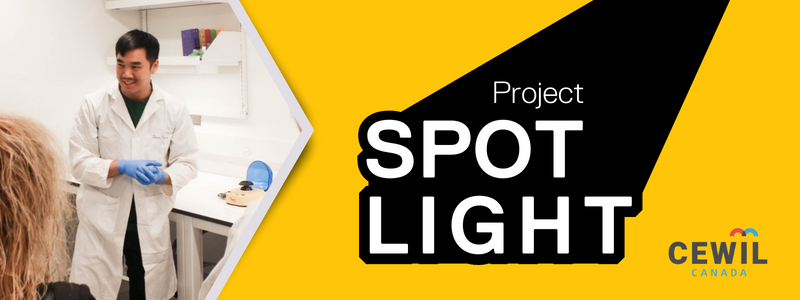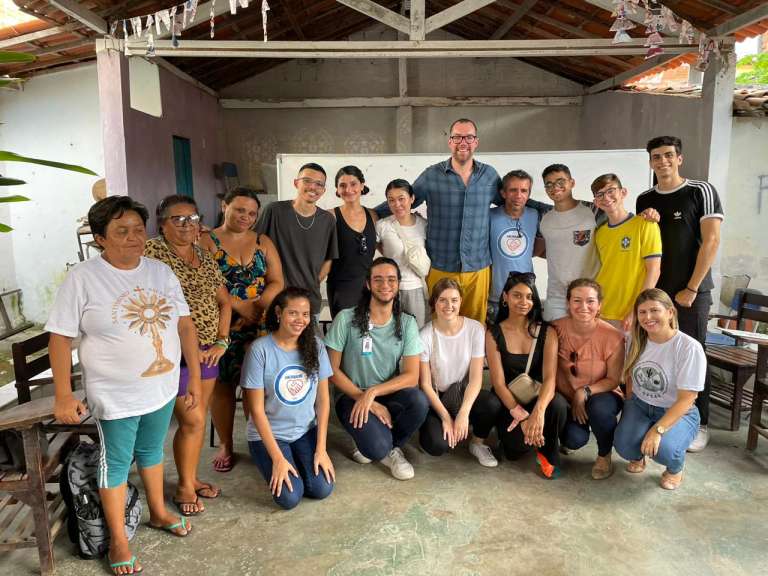CEWIL Project Spotlight: Science Discovery Zone Biomakerspace

As many students in the sciences can attest, experience in a lab setting is largely sought after in order to enhance technical, problem-solving, and scientific research skills. While these students routinely get exposure to techniques, equipment, and experimental procedures in their lab-based courses, there is typically very little room for genuine curiosity and exploration in their research.
According to Ashnie Badal, Coordinator at Science Discovery Zone, a TMU incubator that aims to take evidence-based approaches to test big ideas and discover new ventures, this lack of hands-on experience is less than ideal for students.
This is why Science Discovery Zone launched Biomakerspace, a program that allows students to lean into their curiosity and design their own experiments that help them test hypotheses.
The Biomakerspace program is part of a three-round funding initiative aimed at supporting work-integrated learning in post-secondary institutions, and is administered by the CEWIL iHUB (external link) , or the Co-Operative Education and Work-Integrated Learning Innovation Hub. This project is also supported by the Experiential Learning Hub, a resource area within the Centre for Excellence in Learning and Teaching.
The program focuses on a different topic every semester, with this past cohort having directed their attention to themes of health, sustainability, security, and safety.
Students were brought on from the Faculty of Science, the Ted Rogers School of Management (TRSM), the School of Nutrition and the School of Nursing. According to Badal, these students were chosen because “their skill sets and growing expertise are critical for the types of challenges we’ve focused the program on”, notably healthcare, food sustainability, food security, etc. and these students are always looking for opportunities to develop these skills in a collaborative environment.
“From our experience over the years, these groups of students are often looking for opportunities to apply their skills, whether it be to gain out-of-classroom experiences, work on interdisciplinary projects, or explore the fields of healthcare, food & agriculture, and technology to enhance their expertise. I personally like to highlight the similarity between scientists and entrepreneurs through the fact that both personas focus on solving a problem since all the work they do is meant to tackle a challenge, just through different ways. Scientists do research to develop innovations and entrepreneurs build businesses. This is why in many of our programs we bring together students in science and in business; to create opportunities for them to lean on and learn from each other.”
Examples of challenges that have been explored include:
- How might we tackle trachoma infections in rural / underdeveloped areas to reduce the resulting rate of blindness?
- How might we provide university students access to affordable and culturally appropriate food on campus?
In addition to being able to refine their skills and further explore industries that they are interested in, each student receives a stipend of up to $750 for their work and eligible students also gain access to the SDZ’s biology lab and fabrication space to create and test their own hypotheses.
A wage subsidy is also provided to hire a lab technician solely to support students in the program on their scientific research and experimental design.
“The $750 student stipend is issued to each participant who completes the program with no strings attached. There is no requirement that they spend the money in a particular way. The additional funding we receive from CEWIL is used to support students through recruiting the right expertise (the lab technician) and purchasing materials for them to use in the lab,” says Badal.
A crucial benefit of this experience is that it prepares students for more realistic scenarios in scientific and business careers. By working in teams to explore root causes of real-world problems, students are not only able to develop potential biology-based solutions, but they are also able to explore the feasibility and market potential of those solutions in a lab setting with customers.
The program is broken down into three sections over the course of the semester. During the first month, students undergo essential training before meeting their teams, familiarizing themselves with important deliverables and exploring available projects and challenges.
The second month leads them through the problem research and experimental design stage, where teams do the groundwork to find out why their particular problem exists and complete any additional training required to gain access to the biolab space.
Students can then move to the prototyping and testing phase in the third and fourth months, where they can execute their research plans in a self-guided environment.
Participants also gain access to SDZ mentors, experts, as well as entrepreneurs, while also benefiting from support and encouragement from teammates and peers. Another added benefit are the frequent opportunities for students to connect with startups at the SDZ to exchange ideas and learn from past experiences.
To date, students in the program have been able to work and build relationships with partner organizations such as New School Foods (external link) , Biofect Innovations (external link) , and Science Everywhere (external link) .
In addition to cultivating local partnerships, three students from the program were selected to travel to the Universidade Estadual do Ceará (UECE) (external link) in Brazil in May of 2023 to carry out a co-facilitated evidence-based innovation training program. The team was comprised of Dr. Bryan Koivisto, Associate Professor in the Department of Chemistry and Biology and Graduate Program Director, Ashnie Badal, Coordinator for Science Discovery Zone, and undergraduate students Taryn Hoffman (Nutrition), Greta Zogaj (Biomedicine), and Cally Zeng (Nursing).
The team spent four weeks touring the city of Fortaleza, Brazil, visiting communities, health services and industries with a focus on exchanging ideas and experiences.

Since there is no specific grading model in the Biomakerspace program, students don’t receive a formal grade following completion of their coursework. This helps to reduce the fear of failure according to Badal, and allows students to lean into their creativity and willingness to test out different hypotheses and ideas.
“Unlike case studies in their classes, there isn’t a linear path to take to get to the answer, and so, students need the flexibility to try things out and see failure as opportunities for learning rather than a setback or them doing something wrong,” says Badal.
Instead the program is set up for students to meet milestones in order to track progress.
It’s clear to see that the Biomakerspace is unlike many other extracurricular programs on offer for TMU students.
By offering to not only fund materials, but also provide direct financial compensation for a lab technician, Science Discovery Zone, with the help of CEWIL Canada and the Experiential Learning Hub are working towards reducing barriers and opening doors for student opportunities in academia and industry.